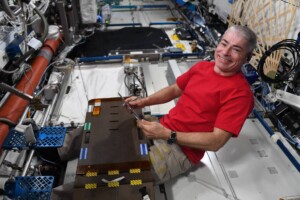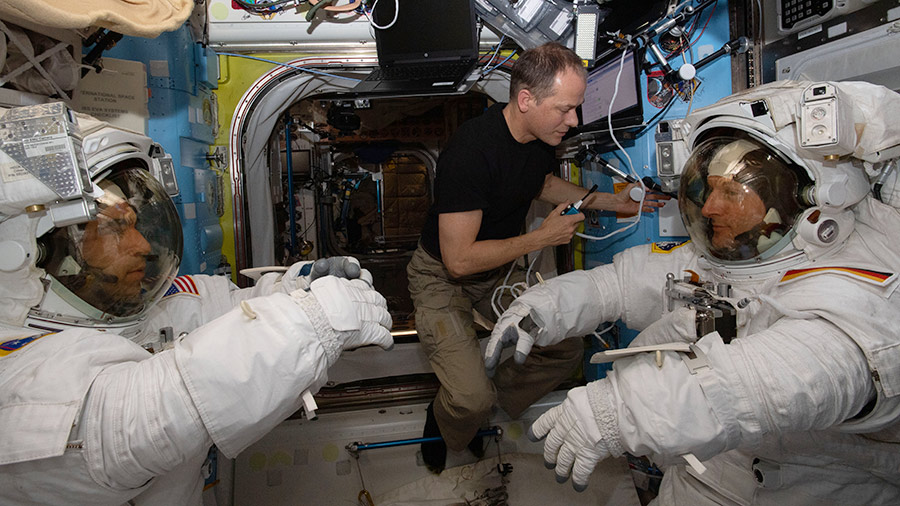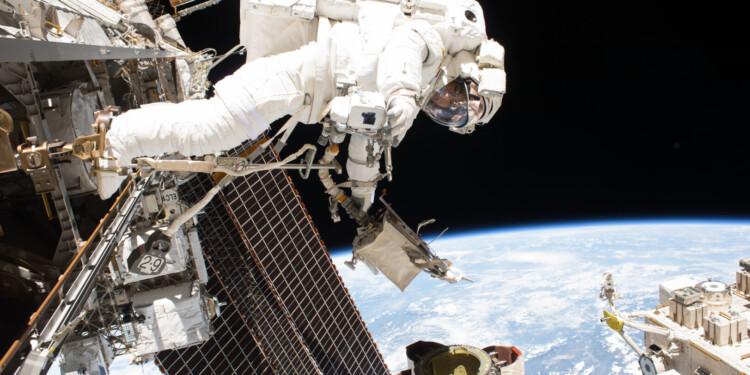The European Space Agency has suspended its €1bn (£844m) ExoMars mission, a joint project with Russia that was due to launch a robotic rover this year in September. Member states of the ESA voted on Thursday to cancel the launch because of the Russian invasion of Ukraine. This decision, while inevitable, is a significant blow to the European space programme. And it obviously ratchets up the tension that already surrounded the West’s space collaboration with Russia – a collaboration that had started as soon as the Soviet Empire had ended.
“The decision was made that this launch cannot happen, given the current circumstances and especially the sanctions that are imposed by our member states,” said agency director-general Josef Aschbacher. “This makes it practically impossible, but also politically impossible to have a launch of [the rover] in September.” But, he added, work on the space station proceeds undisturbed and the cosmonauts “are doing well and doing their operations as planned.”
The Mars rover Esa was to launch, named Rosalind Franklin, was assembled in the UK and was to go up on a Russian rocket. After traveling to Mars on a German-built spacecraft, it would have been placed on the surface by a Russian lander and the work of exploring Mars would have started. Instead, the rover will be placed in storage for the foreseeable future.
Let’s take a step back and look at how we got here.
At the time of writing, the International Space Station (ISS), the very symbol of that collaboration, is in orbit with four NASA astronauts, two Russians and one German from Esa.
Changes in crews are planned. NASA astronaut Vande Hei is due to leave ISS, going back to earth with his Russian colleagues in a Soyuz capsule for a touchdown in Kazakhstan on March 30. When Vande Hei returns to Earth, he will have spent more time in space on a single mission than any other American, a total of 355 consecutive days.

Meanwhile, the next group of cosmonauts is getting ready to go up: Three of them await launch to join the Expedition 66 crew today while two astronauts are preparing for next week’s spacewalk. Here they are counting down to their liftoff aboard the Soyuz MS-21 crew ship at 11:55 a.m.:

The Russian and American parts of the International Space Station depend on each other: The United States provides power to the Russian side, while Russia’s Progress vehicle uses its thrusters to keep the station in the correct orbit.
NASA’s Cygnus spacecraft could also boost the station, but it would require the Russian thrusters to keep it in the correct orientation or altitude, Joel Montalbano, manager of NASA’s International Space Station program, said. He explains: “It’s a team. We work together. There’s not really an operation that you can just separate and go your own way, because of the interdependency that was designed from the beginning.”
Montalbano dismissed the fact that Vande Hei would not be able to fly back to earth with his Russian colleagues due to the Ukraine-Russia war, as initially scheduled. “I can tell you for sure Mark is coming home on that Soyuz,” he said. “We are in communication with our Russian colleagues. There’s no fuzz on that.”
So is it life-as-usual up in space? Not anymore and here is how it happened
The longstanding U.S.- Russian collaboration in space was first called into question last month as the war in Ukraine developed and the West reacted with sanctions. Dmitry Rogozin, head of Russia’s space agency, Roscosmos, suggested U.S. sanctions imposed against Moscow over the Ukraine crisis could “destroy” ISS teamwork and lead to the collapse of the space station itself.
When U.S. President Joe Biden announced high-tech export restrictions on President Vladimir Putin’s government on February 24, he mentioned they were designed to “degrade” Russia’s aerospace industry, including its space program.
A week later, Moscow retaliated by announcing it would stop supplying or servicing Russian-made rocket engines used by two American aerospace companies doing business with NASA.
Significantly, Dmitry Rogozin said last month Roscosmos was suspending its cooperation with European launch operations at the European Spaceport in French Guiana.
After the European Space Agency missed its 2020 launch deadline for the Mars rover — a joint European-Russian effort — the project was on track for a September 2022 launch from Kazakhstan. The expectation had been that it was likely to be postponed to 2024, when the Earth and Mars are properly aligned.
Now, of course, all that is suspended with yesterday’s ESA decision to suspend the ExoMars mission. Dropping Rosalind Franklin on Mars was going to be the second stage of the joint European-Russian mission. The first part, a satellite called the Trace Gas Orbiter, was launched in 2016 and is studying the planet’s atmosphere. It was also supposed to act as a telecommunications relay for Rosalind Franklin when the rover arrived.
The Esa has already commissioned a feasibility study of how to get ExoMars off the ground without Russian (Roscosmos) involvement. Working with Nasa is a possibility and Aschbacher said the US agency had expressed a “strong willingness to support” the mission.
The rover was intended to drill 2m into the surface of Mars to look for signs of life. There are no comparable missions slated in the next decade and the rover should remain viable for several years in storage. However, keeping the mission alive is likely to add significantly to its more than €1bn price tag.
The Esa also said on Thursday that five satellite missions expected to be launched by Soyuz had been cancelled after the decision by Roscosmos to withdraw their personnel from Europe’s spaceport in French Guiana.
Nasa’s reaction so far
When asked on March 14 if the U.S.-Russian space cooperation will get affected by Putin’s invasion in Ukraine, Joel Montalbano still insisted ISS “interdependency” between the two former space rivals remains firmly intact.
“All these activities have continued for 20 years, and nothing has changed in the last three weeks,” Joel Montalbano said, referring to the start of the war in Ukraine on Feb.24. “Are they aware of what’s going on on Earth? Absolutely. But the teams are professional. The astronauts and cosmonauts are some of the most professional groups you’ve ever seen. And there’s really no tension with the team. This is what they’ve been trained to do, and they’re up there doing that job.”
NASA continues to work to fly Russian cosmonauts on American spacecraft, and American astronauts fly on the Russian Soyuz spacecraft, like the one that is expected to bring Vande Hei home in a few weeks, Kathy Lueders, NASA’s associate administrator for space operations said.
NASA for now wants to keep the space station running until 2030, while the Russians have not committed beyond the original end date of 2024. “It would be a sad day for international operations if we can’t continue to peacefully operate in space,” said NASA’s human spaceflight chief Kathy Lueders, who noted it would be “very difficult” to go it alone.
Difficult no doubt, but not impossible given America’s advantage in technology. The problem however has now become a political one, not a technological one. How Nasa will react to Esa’s withdrawal from Russian cooperation over the near term is not yet known. Much depends on how the war in Ukraine will finally be settled.
Editor’s Note: The opinions expressed here by Impakter.com columnists are their own, not those of Impakter.com. In the Featured Photo: Astronaut Mark Vande Hei is pictured attached to the outside of the space station during a spacewalk. Featured Photo Credit: NASA via Flickr.










